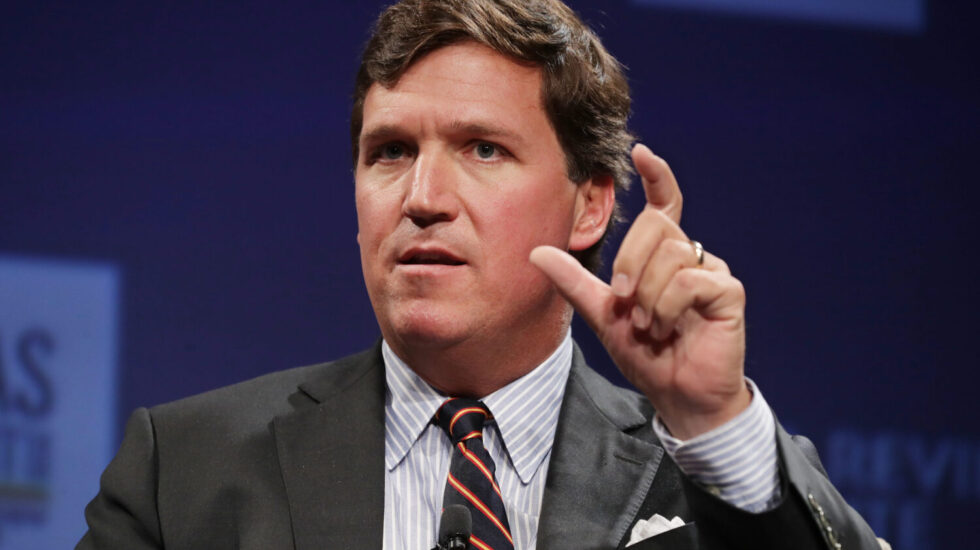As Russian autocrat Vladimir Putin leads his country toward an unprovoked war with Ukraine, a global consensus has emerged: he’s a bad guy who must be stopped. Otherwise, decades of stability in Europe are imperiled and the Ukrainian people could be annexed into a repressive and murderous regime.
Indeed, as Putin ratchets up tensions in his corner of the world, Western leaders have piled on sanctions. Even a human rights abuser like China, normally a Russian ally, has been circumspect about the possibility of a Russian invasion, calling for diplomacy and “consultation.”
But one faction in the U.S. – closely associated with former President Donald Trump’s ‘America First’ movement – has aligned itself with Putin, repeating his talking points, coddling his grievances, and openly admiring his “strength.”
Trump, in fact, called Putin’s provocative decision to designate two breakaway regions of Ukraine as independent states – which is a clear violation of international law – “genius.”
“Here’s a guy who’s very savvy… I know him very well. Very, very well,” Trump boasted Tuesday on a conservative radio show.
Trump’s former Secretary of State, Mike Pompeo, made similar remarks last week, calling Putin “very shrewd. Very capable.” He added, “I have enormous respect for him.”
Pompeo since clarified that “Vladimir Putin is the aggressor” in the current geopolitical drama, but his praise for the strongman has been aired on Russian state TV. Witting or not, that means America’s former top diplomat provided Putin with a major propaganda win.
Trump and Pompeo, when pressed, like to talk about their administration’s supposedly tough stance on Russia (although they never mention Trump’s obsequious Helsinki appearance alongside Putin).
But even if that were true, these are men who can never spare a kind word for the sitting president of the United States, but manage to summon high praise for a former KGB agent who has murdered political rivals, journalists, dissidents, and members of the LGBT community.
This deeply revealing imbalance – praise for an American rival, criticism for the commander-in-chief – is particularly contemptible during a global crisis, as is the case now. The GOP uses the concept of “national unity” as a jingoistic battering ram when it suits their ends, but here they explicitly give aid and comfort to the enemy in order to stick to their one-note script: Biden is awful, illegitimately elected, probably a communist, bad bad bad.
America’s political discourse has descended to this low place in no small part because of a media ecosystem that rewards hyperbole and shuns nuance. Criticism of Biden (and now, oddly, Canadian Prime Minister Justin Trudeau) paired with praise of iron fisted leaders like Putin or Hungary’s Viktor Orbán is a shortcut to an appearance on Fox News or any of its loathsome spinoffs.
Tucker Carlson, the cable news journeyman who finally found stability at Fox as a ‘just-asking-questions’ demagogue, has spent the past several weeks defending Putin and comparing him favorable to other world leaders. On Tuesday night, he used the culture war as a frame for a conflict that could bloom into an actual war, asking his viewers, “It may be worth asking yourself… why do I hate Putin? Has Putin ever called me a racist? Has he threatened to get me fired for disagreeing with him?”
(For a deep-dive on Carlson’s pro-Russia, pro-Putin commentary, we suggest this article from The Bulwark’s excellent William Saletan)
Meanwhile, in the swamps of conservative social media, right-wing influencer Candace Owens told her three million Twitter followers that if they want to “know what’s *actually* going on in Russia and Ukraine” they should read Putin’s rambling, fact-less speech to his top advisors.
Serious people, by and large, do not take Carlson or Owens seriously. But the unserious vote too and the Republican Party has been complicit in promoting a scorched earth form of grievance politics that is animated by manufactured resentments. Because this dynamic has persisted for so long, it’s perhaps fool-hardy to hope it will change anytime soon. But when historians turn their attention to the last five years, Putin will undoubtedly be cast as a villain – and so will his American cheerleaders.



